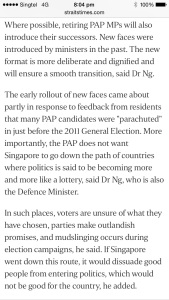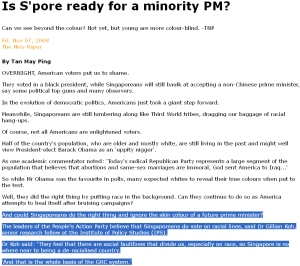This is a response to a heartfelt letter in the Straits Times, where the writer claimed primary schools are doing everything wrong.

1. On the “Necessity of tuition”
Actually, tuition is not necessary. If parents believed the moe line, that every school is a good school, then they don’t need tuition. Indeed, there are a lot of poor kids who don’t have tuition because their families can’t afford tuition.
But many parents want their kids to do well, to go to top schools. So they hire tutors.
All champion boxers have trainers. Golf pros have swing coaches. Pro tennis players have coaches. So do swimmers. Etc. Some even have psychologists and nutritionists on call.
Amateurs, on the other hand, rarely have personal coaches.
The implication is obvious. You want to play at a top level, you need a coach.
Singapore parents want their kids to compete, so they hire coaches for their kids.
And it’s not just academic. Do you know how kids get admitted into School of the Arts? They audition for it. Guess what kinds of kids turn up for auditions? The kinds of who personal music tutors. Who have weekly piano or violin lessons. Who have had such lessons since they were old enough to walk.
Same for Singapore Sports School.
That’s the reality of Singapore
2. On “sole reliance on academic results for progression and placement in good schools”
Actually, it’s much more than academic results. They want kids who represented Singapore in international sports, or at least represented their schools in national competitions. Or kids with some special talent. Or who can contribute to the school in some way, eg wushu champion. That’s in addition to meeting the academic criteria for entry.
So yes, it’s bloody competitive.
But that’s why those schools are top schools. If they admitted any Tom, Dick or Harry, they wouldn’t be top schools any more, they’d be no different from neighbourhood schools.
How to resolve this contradiction?
3. On teaching “more creativity in schools”
Yes it’s true that moe teachers stick to their rubrics and children are told to solve problems in standard ways.
But (1) I don’t think school teachers in general can teach creativity nor do I think creativity (or entrepreneurship for that matter) can be taught; (2) use of standardized methods does not amount to rote learning or memorization.
In fact, open book exams are common at university level now, which shows exams are not about regurgitation of memorized facts any more, but of demonstrating ones ability to understand and apply concepts. Even at the primary level, those who memorise do so because they haven’t really been taught to understand. That’s not the fault of the rubric or the syllabus, it’s due to a lousy teacher or a poor student.
4. On “Learning at own pace, identifying and enhancing the child’s strengths, and encouraging him to succeed”
There are various paces, such as normal and express, and there are elite and non-elite schools, which push students differently. But it seems a lot of parents want their children to go to elite schools, even if the child is not suitable. They’ll volunteer, they’ll donate to the school, they’ll move to within 1 km, they’ll hire tutors for every subject, send them for enrichment classes etc.
Is it moe’s fault if this pressurizes the kid?
5. On “A students end up working for C students”
There are undoubtedly entrepreneurs who were school dropouts. However, the author does not offer any statistical evidence to support his assertions. More interestingly, one should ask why C student bosses hire A-grade students and not C students.
Notwithstanding the above, the letter writer may not be aware that companies these days look for far more than just A grades when hiring. They look for people who are the captain of the school football team or have represented Singapore in swimming, or karate or whatever. Why? Because that is evidence not only of leadership potential, but also of killer instinct, of a strong competitive streak. In other words, they’re looking for winners. Not just bookheads.
Does anyone think such people are lesser in their hunger, drive or competitive nature than any school dropout? Anyone thinks such people end up as administrators?
Anyone who still thinks good grades alone is enough will be in for a rude shock.
6. Summary
The school system is a microcosm of society. If society is competitive, schools cannot be relaxed. If society is elitist, there will be elite schools.
Singapore society is competitive. So I don’t think the education system can be otherwise. Not even at primary level.
One must note this is not just Singapore. It’s Asia in general. Japan, Korea, Taiwan, Hong Kong, China– all have schools that are highly competitive where lives revolve around doing well and studying like mad. I think it’s an Asian thing, not just a Singapore thing or a PAP thing. So I don’t blame the PAP in this instance.



